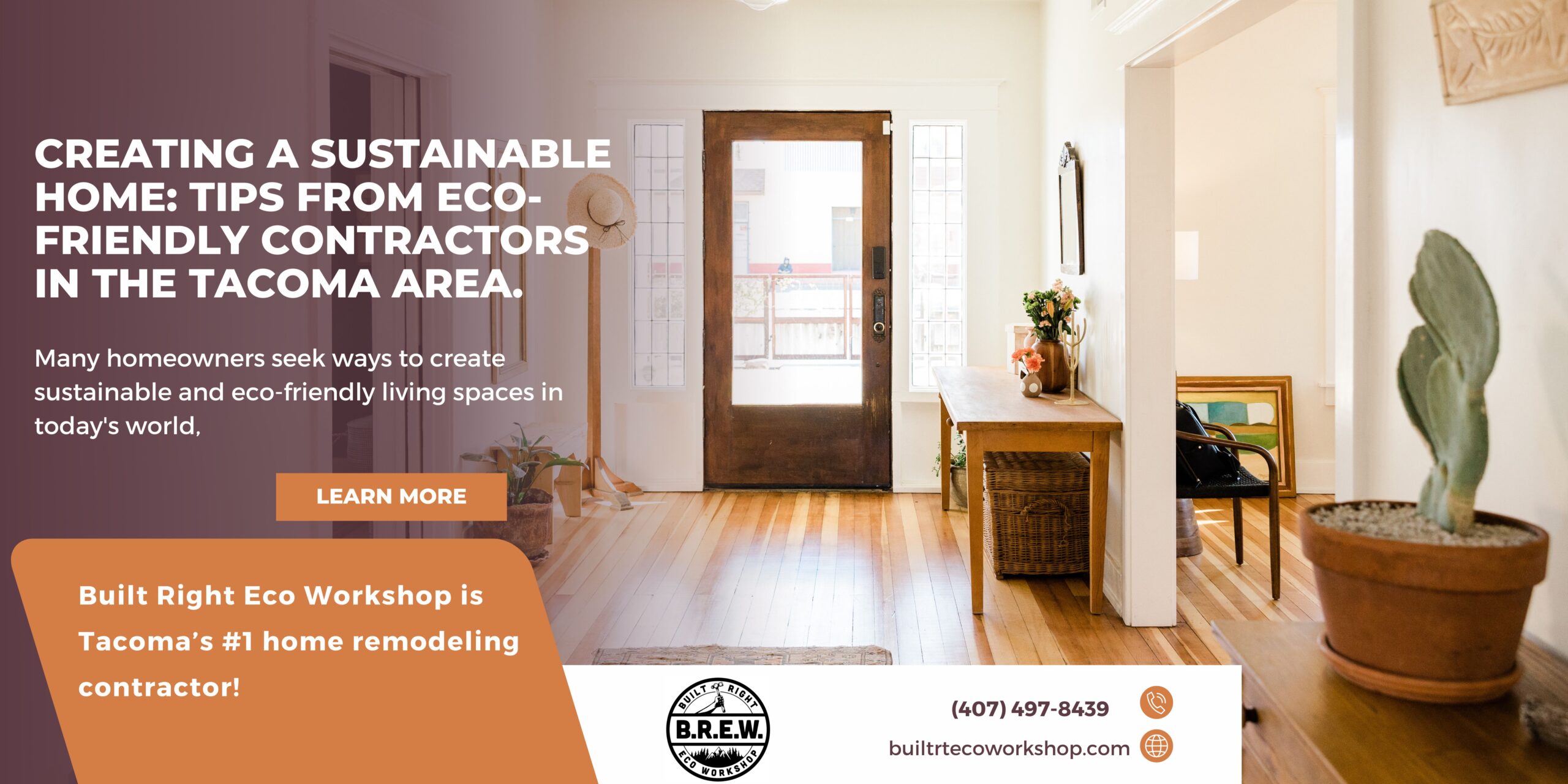
Many homeowners seek ways to create sustainable and eco-friendly living spaces in today’s world, where environmental concerns are growing. Sustainable homes help reduce our carbon footprint and contribute to healthier living environments. If you’re looking to transform your home into a sustainable haven, who better to seek advice from than eco-friendly contractors? In this blog, we will explore some valuable tips from these professionals that can guide you toward creating a sustainable home.
Prioritize Energy Efficiency: One of the essential aspects of a sustainable home is energy efficiency. Eco-friendly contractors recommend using energy-saving measures such as proper insulation, energy-efficient appliances, and LED lighting. Proper insulation helps reduce heat loss during winter and heat gain during summer, reducing energy consumption. Installing Energy Star-rated appliances and LED lights can significantly lower your electricity usage and, consequently, your environmental impact.
Opt for Renewable Energy Sources: Eco-friendly contractors emphasize the importance of harnessing renewable energy sources. Installing solar panels on your roof can generate clean and renewable electricity to power your home. With advancements in solar technology, the cost of solar panels has been reduced, making it an attractive long-term investment. Additionally, considering wind turbines or geothermal systems can enhance your home’s energy efficiency and sustainability.
Choose Sustainable Materials: Selecting eco-friendly materials is crucial for sustainable home construction or renovation. Eco-friendly contractors advocate for materials with low environmental impact, such as reclaimed wood, bamboo, cork, and recycled materials. These options reduce the depletion of natural resources and minimize waste generation. Furthermore, using non-toxic paints and finishes helps improve indoor air quality and prevents harmful chemicals from being released into the environment.
Implement Water Conservation Measures: Conserving water is another significant aspect of sustainable living. Eco-friendly contractors suggest installing low-flow plumbing fixtures, such as faucets, showerheads, and toilets, to reduce water consumption without compromising functionality. Additionally, implementing rainwater harvesting systems can help collect and store rainwater for various non-potable uses like watering plants or flushing toilets, reducing reliance on municipal water sources.
Foster Natural Lighting and Ventilation: Maximizing natural lighting and ventilation reduces the need for artificial lighting and air conditioning and enhances the overall comfort and well-being of your home. Eco-friendly contractors recommend incorporating large windows, skylights, and strategically placed openings to allow ample natural light and fresh air into your living spaces. This design approach promotes energy efficiency, reduces reliance on electrical lighting and mechanical ventilation, and creates a healthier indoor environment.
Benefits of a Sustainable Home
Creating a sustainable home goes beyond being environmentally conscious—it brings many benefits that positively impact individuals and the planet. Let’s explore the advantages of embracing sustainable practices in your home:
Reduced Environmental Footprint: One of the primary benefits of a sustainable home is the significant reduction in your environmental footprint. By implementing energy-efficient measures, utilizing renewable energy sources, and choosing eco-friendly materials, you contribute to conserving natural resources, reducing greenhouse gas emissions, and protecting ecosystems. Your sustainable choices help mitigate climate change and preserve the planet for future generations.
Lower Energy Costs: Sustainable homes are designed to be highly energy-efficient, resulting in lower energy consumption and, consequently, reduced utility bills. Investing in insulation, energy-efficient appliances, LED lighting, and renewable energy systems like solar panels can significantly decrease energy usage and save money in the long run. These savings accumulate over time, allowing you to allocate resources toward other priorities.
Improved Indoor Air Quality: Creating a sustainable home involves using non-toxic materials, paints, and finishes, directly contributing to improved indoor air quality. Conventional building materials and products often release harmful chemicals into the air, leading to health issues such as allergies and respiratory problems. Choosing sustainable materials low in volatile organic compounds (VOCs) creates a healthier living environment for yourself and your family.
Enhanced Comfort and Well-being: Sustainable homes prioritize natural lighting, proper insulation, and ventilation, increasing comfort and well-being. Large windows, skylights, and strategically placed openings allow ample natural light to enter your living spaces, positively impacting mood and productivity. Additionally, efficient insulation and air sealing techniques create a more consistent indoor temperature, minimizing drafts and ensuring a comfortable atmosphere throughout the year.
Water Conservation: Water is a precious resource, and sustainable homes incorporate water-saving measures to reduce consumption. Low-flow plumbing fixtures, rainwater harvesting systems, and drought-resistant landscaping contribute to efficient water usage. By conserving water, you reduce utility bills, promote responsible water management, and help alleviate water scarcity in your region.
Long-term Durability and Cost Savings: Sustainable homes often prioritize high-quality, durable materials requiring less maintenance and longer lifespans. Choosing materials resistant to wear and tear, decay, and pests means fewer repairs and replacements. In the long run, this translates to significant cost savings as you minimize the need for frequent renovations and replacements.
Increased Property Value: As sustainability becomes more mainstream and sought after, sustainable homes tend to have higher property values. Buyers increasingly recognize the long-term benefits and cost savings associated with eco-friendly features. Investing in sustainable practices contributes to a better planet and potentially increases your home’s resale value.
Positive Influence and Inspiration: Creating a sustainable home sets an example for others and can inspire your friends, family, and community to adopt similar practices. Sharing your journey and the benefits you’ve experienced can create a ripple effect, encouraging others to make sustainable choices in their homes. Together, we can create a more sustainable future for everyone.
Embracing sustainability in your home brings numerous benefits that extend beyond immediate comfort and cost savings.
By reducing your environmental footprint, saving energy, improving indoor air quality, and promoting water conservation, you contribute to a healthier planet and a better quality of life for yourself and future generations. The benefits of a sustainable home are far-reaching, encompassing economic, environmental, and social aspects, and your positive impact is invaluable.
Prioritizing energy efficiency, opting for renewable energy sources, choosing sustainable materials, implementing water conservation measures, and fostering natural lighting and ventilation are key steps toward creating a sustainable home. Embrace these tips and enjoy the satisfaction of living in a harmonious, eco-friendly environment that promotes a more sustainable lifestyle for you and future generations.
Contact Build Right Eco Workshop in Tacoma.
If you want to remodel your home, refurbish, or build a brand new sustainable home or a DADU (Detached Accessory Dwelling Unit), contact Built Right Eco Workshop. See a list of our comprehensive contractor services in the Tacoma area.
